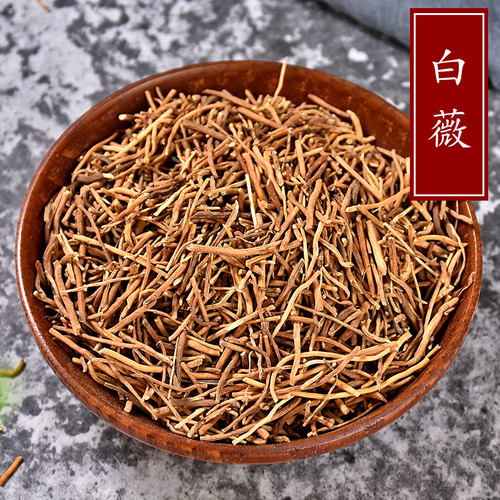Product Overview
Parts used: Dried root and rhizome
TCM category: Herbs that clear Heat and dry Dampness
TCM nature: Cold
TCM taste(s): BitterSalty
Meridian affinity: Stomach Kidney Liver
Scientific name: Cynanchum atratum or Cynanchum versicolor
Other names: Dog-strangling vine, Cynanchi, Blackend swallowwort
Use of swallow-wort roots (Bai Wei) in TCM
Please note that you should never self-prescribe TCM ingredients. A TCM ingredient is almost never eaten on its own but as part of a formula containing several ingredients that act together. Please consult a professional TCM practitionner, they will be best able to guide you.
Preparation: Remove impurities, wash, cut into sections and dry.
Dosage: 3 - 9 grams
Main actions according to TCM*: Cools the Blood and expels Deficient Heat. Clears Heat in the Blood by encouraging urination. Detoxifies when used either internally or externally.
Primary conditions or symptoms for which swallow-wort roots may be prescribed by TCM doctors*: fever Strangury Carbuncles Sores Urinary tract infection Sore throat Hematuria Snake bites
Contraindications*: This herb should not be used by those with diarrhea or those with no true Heat signs.
Common TCM formulas in which swallow-wort roots are used*:
For postpartum inflammation, septicemia and/or accompanying restlessness combine swallow-wort roots with ginseng (Ren Shen), dong quai (Dang Gui) and liquorice (Gan Cao).
For urinary tract infections caused by Yin Deficiency combine swallow-wort roots with lophatherum herbs (Dan Zhu Ye) and ginseng (Ren Shen).
Key TCM concepts behind swallow-wort roots (Bai Wei)'s properties
In Traditional Chinese Medicine (TCM), swallow-wort roots are plants that belong to the 'Herbs that clear Heat and dry Dampness' category. Herbs in this category are used to clear inflammatory and infectious conditions, referred to as 'Internal Heat' in TCM. This is why most of the herbs in this category will have both antibacterial and antiviral properties. In TCM one has too much 'Heat' in their body as a result of a deficiency of 'Yin' (which is Cold in nature, see our explanation on Yin and Yang) or, more commonly, an excess of Yang (Hot in nature). Herbs that clear Heat and dry Dampness treat the latter while, at the same time, relieving the body of excess Dampness. As such they tend to be Cold or Neutral in nature.
As suggested by its category swallow-wort roots are plants that are Cold in nature. This means that swallow-wort roots typically help people who have too much "heat" in their body. Balance between Yin and Yang is a key health concept in TCM. Those who have too much heat in their body are said to either have a Yang excess (because Yang is Hot in nature) or a Yin deficiency (Yin is Cold in Nature). Depending on your condition swallow-wort roots can help restore a harmonious balance between Yin and Yang.
Swallow-wort roots also taste Bitter and Salty. The so-called "five elements" theory in Chinese Medicine states that the taste of TCM ingredients is a key determinant of their action in the body. Bitter ingredients like swallow-wort roots tend to have a cleansing action on the body by clearing heat, drying dampness and promoting elimination via urination or bowel movements. On the other hand Salty ingredients tend to have a draining effect in the body because they clear accumulations, remove phlegm and soften hard lumps.
The tastes of ingredients in TCM also determine what organs and meridians they target. As such swallow-wort roots are thought to target the Stomach, the Kidney and the Liver. In TCM the Stomach is responsible for receiving and ripening ingested food and fluids. It is also tasked with descending the digested elements downwards to the Small Intestine. The Kidneys do not only regulate the urinary system but also play a key role in the reproductive system and the growth and aging process of the body. The Liver is often referred as the body's "general" because it is in charge of regulating the movements of Qi and body fluids. It also takes a leading role in balancing our emotions.










